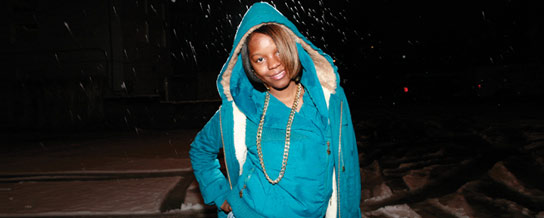Rye Rye: Taking the Club World
The skyrocketing career of the tiny rapper dubbed Rye Rye started with a phone message. […]

Rye Rye: Taking the Club World
The skyrocketing career of the tiny rapper dubbed Rye Rye started with a phone message. […]

The skyrocketing career of the tiny rapper dubbed Rye Rye started with a phone message. It was 2006, and Ryeisha Berrain was 16 years old. Understand, being an urban teenager in Baltimore means going to clubs as early as you can get a fake ID—places like the labyrinthine Club Choices that stay open all night thumping to Baltimore club and hip-hop mixes from local names like DJ Big L or the late DJ K-Swift.
Baltimore’s a small city, and it becomes a tight community. You see it on the dancefloors, the hierarchies, the associations—it becomes a web. So it’s no surprise that Rye Rye, then just another girl at the club (albeit the sort of vivacious dancer that kinda makes you feel like a klutz just being in the same city with her) was two degrees of separation from club producer Blaqstarr. “My sister knew him,” she says by phone from her Baltimore home. “One day I was writing a song just for fun, and she was on the phone with him and he asked if [I] was around. I dunno, I guess because of the sound of my voice. So, I left a song on his answering machine.”
The song was the second verse of the infectious party track “Shake It to the Ground,” what’s become one of the most exported—and remixed—Baltimore club tracks since the genre kicked off as a bastard child of Chicago house and East Coast rap in the late ’80s. From hipster DJ crates in Oregon to Berlin dance clubs to Baltimore warehouses, “Shake It to the Ground” became an introduction to Baltimore club for a whole mess of people.
Within a year, Blaqstarr had gone on to produce tracks on M.I.A.’s star-making Kala and Rye Rye was asked to tour with the Sri Lankan firebrand. Rye Rye was still 17, touring overseas for months at a time and returning home to Baltimore to continue school and life as a teenager. “It’s weird,” she says, “especially when I was in school. I would be gone for, like, months at a time and be back again startin’ school. When I got back, everybody was, like, singing my songs, tryin’ to imitate my voice. My voice is so different, so it ain’t right.”
This spring, Rye Rye became one of very few Baltimore rappers to release a major-label album, via a licensing deal between Universal and M.I.A.’s NEET label. Rappers in the city get signed all the time, but rarely does anything come of it—rappers that have fought through the ranks for decades haven’t made it this far. But, boosted by producers like Blaqstarr, Sinden, and Diplo, both Baltimore and its club music are even more en vogue in 2009. And Rye Rye has the unique ability to keep up a flow to match the style’s amphetamine breakbeats. “When I was eight years old, [Baltimore club is] what we used to dance [to],” she says. “And from then on like it was always [my] kind of music.”

